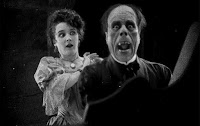Leroux's classic 1909 novel, Phantom of the Opera, itself adapted from ageless works, ranging from Greco Roman storytelling to the Gothic novels by twentieth-century novelists such as Victor Hugo, is one example. He told of eternal human themes such as the tragedy of romance and the suffering of a societal outcast.
In 1925, new communications technology of that era enabled Leroux's work to come to life on the screen as a silent movie. Some argue this adaption remains the most accurate interpretation of Leroux's novel. As a result, many movie adaptions have followed.
In 1962, Herbert Lom played Erik in a Hammer film production, a typically darker Hammer re-make, conveying the gothic glamour of Leroux's novel. Then in 1986, Andrew Lloyd Webber introduced the most influential adaption since the 1925 silent movie. Michael Crawford and Sarah Brightman played Erik and Christine in a more sensual musical version of the story. Again, Erik is a musical genius, but he's also a manipulative sociopath cast into the shadows due to his grotesque physical affliction. Thirty-five years on, it remains the most influential adaption.
More re-makes followed in the next three decades, ranging from the stomach-churning gore starring Robert Englund (1989); to baroque romance with Charles Dance (1990); to the visually sensual feast featuring Gerard Butler (2004).
I have a personal fascination for Leroux's work, re-telling his work, in my 2019 novel, Phantoms. I'm releasing the sequel in early 2022, Chandelier. Chandelier imagines how Leroux's novel will be re-told a hundred years from now, in an age of rapid technological change, global environmental degradation and the emergence of superior intelligence - AI. How would Leroux's masterpiece be interpreted in a post-singularity era of 2121?
Do you have a favourite film adaption?



No comments:
Post a Comment